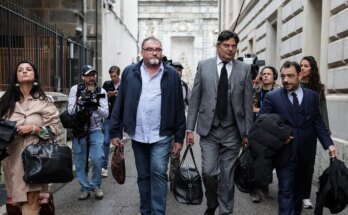Volodimir Zelenskyj landed in Paris this Monday to meet his counterpart, Emmanuel Macron. He did so after visiting Greece on Sunday and before traveling to Madrid on Tuesday. The sequence is not new. This is the ninth trip of the Ukrainian president since the start of the war with Russia in 2022. This time, however, he did not come to ask for help, but to buy it.
France prepared a reception for the Ukrainian leader as a client. In a ceremony held at the Villacoublay military base, the Ministry of Defense and the companies that deal with its logistics and armaments needs presented the entire catalog of offers in Kiev. The old man actions military with which the defense of the invaded country was fueled has ended. And now, it has been implied, we will enter the phase whose rules will be dictated by the market. Another thing is how Ukraine will be able to pay.
“It seeks to advance even further to allow Ukraine to defend itself, putting French excellence in the armaments sector at the service of its needs: anti-aircraft defense, anti-drone warfare, weapons, technologies,” Elysée sources explained before the visit. “The recent nighttime attacks highlight the urgency.”
Accompanied by defense and foreign ministers, Zelensky reviewed the troops and stood in front of French military equipment, including Rafale fighter jets, SAMP/T NG and Aster 30 B NT air defense missiles, GF 300 radars and drones. The visit culminated with the signing of a letter of intent with great solemnity.
The military cooperation agreement has a duration of ten years and will depend, to a large extent, on the end of the war. The signed document includes the purchase of up to 100 Rafale fighters, produced by France’s Dassault Aviation, and all their “associated armaments”. Zelensky said that this pact will allow for a “substantial strengthening of defense capacity,” noting that Ukraine will also be able to receive four radars, eight air defense systems and six missile launch systems.
Macron stressed that the goal is to modernize the Ukrainian army to bring it closer to NATO standards, arguing that “Ukraine is Europe’s first line of defense.” The French president confirmed that the collaboration aims to bring French “industrial and technological excellence” to the heart of Ukraine.
The problem is that the agreement comes at one of the worst moments of the Zelenskiy administration, rocked by the biggest corruption scandal of his presidency. Several officials and people close to the head of state are accused of having stolen around 86 million euros from the energy sector.
Something that is also worrying in France and among the community partners most favorable to Ukraine’s integration into the European Union. “We have a dialogue of trust with the Ukrainian authorities. As part of the accession process, they are aware of our requests regarding transparency and the fight against corruption. The exchanges take place with frankness and trust”, they say at the Elysée.
Since the beginning of the war, France had signed agreements with Ukraine for the sale of weapons worth 8.6 billion euros, which included, among other things, different types of anti-tank missiles, Mistral air defense missiles, Caesar guns, armor, the transfer of Mirage 2000 fighters used by the French army, ammunition or individual equipment for soldiers.
From Villacoublay, Macron and Zelenskyj moved to Mont Valérien, in the city of Surennes, where the general staff of the coalition of volunteers made up of 35 countries, mostly European, is located, working to prepare security guarantees for Kiev in the event that a ceasefire is reached with Russia.
These guarantees, which would imply the deployment of troops from some countries of the aforementioned coalition in Ukraine, come at the expense of an agreement to end hostilities. In the press conference at the Elysée, Macron referred to this: “Everything is ready for peace in Ukraine, it is only Russia that rejects it.” Furthermore, the French president condemned Russia’s “obstinacy” and “imperialist and neocolonial” ambitions and expressed hope that peace could be achieved “before 2027.”



